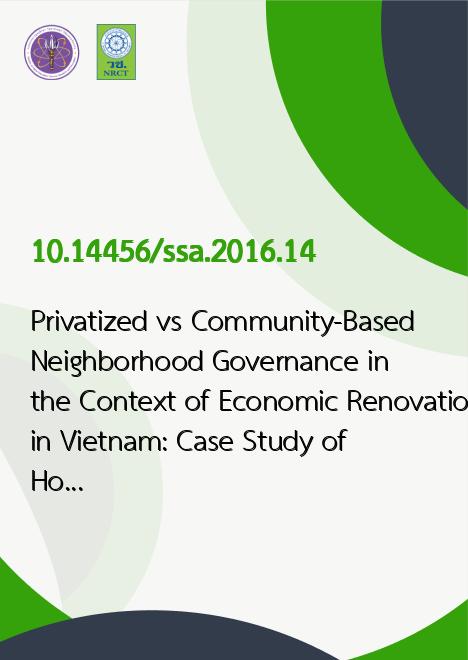
|
Privatized vs. Community-Based Neighborhood Governance in the Context of Economic Renovation in Vietnam: Case Study of Ho Chi Minh City |
|---|---|
| รหัสดีโอไอ | |
| Creator | Le Thi Thu Huong |
| Title | Privatized vs. Community-Based Neighborhood Governance in the Context of Economic Renovation in Vietnam: Case Study of Ho Chi Minh City |
| Publisher | National Research Council of Thailand |
| Publication Year | 2559 |
| Journal Title | Social Science Asia |
| Journal Vol. | 2 |
| Journal No. | 2 (April) |
| Page no. | 40-54 |
| Keyword | economic renovation (Doi Moi), housing segregation, neighborhood governance,private developer, local government, community, civil society organization. |
| ISSN | 2229-2608 |
| Abstract | Rapid economic growth, as a result of economic reforms, has commonly brought unintendedoutcomes of increasing socio-spatial differentiation and unequal neighborhood developmentin post-socialist cities. Through two case studies in Ho Chi Minh City, Vietnam eachcorresponding to a residential area with adverse socio-economic conditions, this paper arguesthat since economic renovation began in the country in 1986, coupled with the housingsegregation in urban development, neighborhood governance has become increasinglydifferentiated with the emergence of the private sector and more active communities as wellas civil society organizations in dealing with neighborhood issues. Their level of involvementand effectiveness in governing the neighborhood depends on the background of thecommunities and the loosening role of local government. Although more privatizedneighborhood governance brings better quality to urban neighborhoods in association withbetter socio-economic conditions for the residents, the level of the residents' participation inneighborhood governance and the sense of community in such cases is weaker than that inthe case of a community-based approach, which results in poorer neighborhood conditionsdue to the lower socio-economic profile of the residents. |